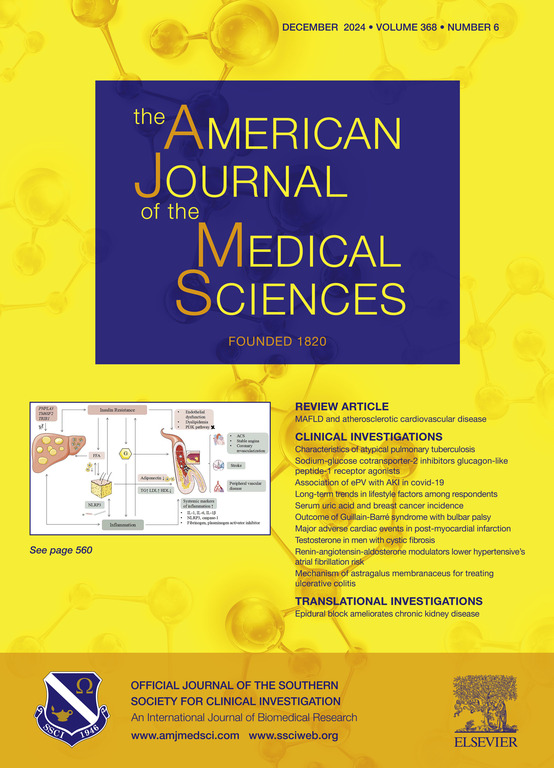胰高血糖素样肽1受体激动剂在肥大细胞激活综合征中的应用。
IF 1.8
4区 医学
Q2 MEDICINE, GENERAL & INTERNAL
引用次数: 0
摘要
简介:肥大细胞(MC)激活综合征(MCAS)是一种源于不适当的MC激活而几乎没有肿瘤MC增殖的疾病,与肥大细胞增多症不同。由于在大多数情况下,潜在的MCAS调节基因突变谱存在很大的异质性,并且导致MCs表达的数百种有效介质的异常表达存在很大的异质性,因此MCAS具有很大的异质性,但主要表现为慢性多系统多发病,通常是炎症、过敏和营养不良行为。MCAS在多个层面上的异质性为确定最佳的个体治疗提出了挑战。靶向通常受影响的疾病各种症状的下游效应物可能产生独立于个体患者的根/上游突变谱的临床益处。胰高血糖素样肽-1受体激动剂(GLP-1RAs)与存在于多种细胞(包括MCs)上的GLP-1受体作用。这些药物已经被批准用于治疗一些慢性炎症性疾病(如2型糖尿病、肥胖症、阻塞性睡眠呼吸暂停),但越来越多的人认为这些药物有助于治疗广泛的其他炎症性疾病(如阿尔茨海默病)。方法:我们提出了第一个案例系列,展示了各种GLP-1RAs在不同种类的此类患者中管理难治性MCAS的效用。结果:在47例患者中(年龄15-71岁,89%为女性),89%显示GLP-1RAs对MCAS相关的广泛问题有临床益处。结论:GLP-1RAs可能对MCAS有实质性的益处。需要随机对照试验来评估GLP-1RA治疗MCAS的疗效,并确定最佳剂量。本文章由计算机程序翻译,如有差异,请以英文原文为准。
Utility of glucagon-like-peptide-1-receptor agonists in mast cell activation syndrome
Introduction: Mast cell (MC) activation syndrome (MCAS) is a collection of illnesses rooted in inappropriate MC activation with little to no neoplastic MC proliferation, distinguishing it from mastocytosis. Due to great heterogeneity in the underlying MC regulatory gene mutational profiles present in most cases and resulting great heterogeneity in aberrant expression of the hundreds of potent mediators known to be expressed by MCs, MCAS presents with great heterogeneity but dominantly manifests as chronic multisystem polymorbidity of generally inflammatory, allergic, and dystrophic phenotypes. MCAS’s heterogeneity at multiple levels poses challenges for identifying optimal individual treatment. Targeting commonly affected downstream effectors of the disease’s various symptoms may yield clinical benefit independent of the root/upstream mutational profile in the individual patient. Glucagon-like peptide-1 receptor agonists (GLP-1RAs) engage with GLP-1 receptors present on many types of cells, including MCs. These drugs are already approved for management of a few chronic inflammatory diseases (e.g., diabetes mellitus type 2, obesity, obstructive sleep apnea) but are increasingly being appreciated to help in a wide range of other inflammatory diseases. Methods: We present the first case series showing utility of a variety of GLP-1RAs for managing refractory MCAS in a diverse assortment of such patients. Results: Among 47 cases (mean age 39, range 15–71, 89 % female), 89 % demonstrated clinical benefit with GLP-1RAs for a broad range of problems associated with MCAS. Conclusion: GLP-1RAs may have substantial benefit in MCAS. Randomized controlled trials are needed to assess the efficacy, and identify optimal dosing, of GLP-1RA treatment in MCAS.
求助全文
通过发布文献求助,成功后即可免费获取论文全文。
去求助
来源期刊
CiteScore
4.40
自引率
0.00%
发文量
303
审稿时长
1.5 months
期刊介绍:
The American Journal of The Medical Sciences (AJMS), founded in 1820, is the 2nd oldest medical journal in the United States. The AJMS is the official journal of the Southern Society for Clinical Investigation (SSCI). The SSCI is dedicated to the advancement of medical research and the exchange of knowledge, information and ideas. Its members are committed to mentoring future generations of medical investigators and promoting careers in academic medicine. The AJMS publishes, on a monthly basis, peer-reviewed articles in the field of internal medicine and its subspecialties, which include:
Original clinical and basic science investigations
Review articles
Online Images in the Medical Sciences
Special Features Include:
Patient-Centered Focused Reviews
History of Medicine
The Science of Medical Education.

 求助内容:
求助内容: 应助结果提醒方式:
应助结果提醒方式:


